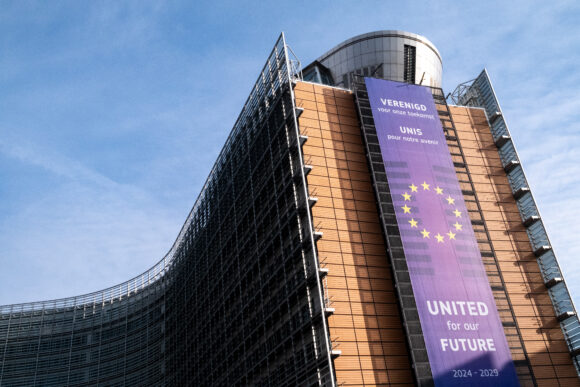European Union lawmakers agreed to move ahead with major cuts to a set of sustainability directives, after intense pressure from the bloc’s biggest member states.
The EU Parliament’s Committee on Legal Affairs voted on Monday to have the Corporate Sustainability Reporting Directive (CSRD) apply only to companies with at least 1,000 employees; for the Corporate Sustainability Due Diligence Directive (CSDDD), the threshold will be 5,000. Both directives were originally intended to cover companies with at least 250 employees.
The vote is the culmination of months of lobbying from business groups that argued the directives would hurt European competitiveness. CSDDD, designed to ensure companies are held accountable for human rights and environmental violations in their value chains, had emerged as a particularly contentious framework. Even after being drastically cut back in scope, Europe still faces pressure to rein the directive in further.
The Details:
The so-called juri committee voted to limit CSDDD to companies with at least 5,000 employees and €1.5 billion in annual revenue; they also agreed to drop a common civil-liability regime. Companies in scope will be required to ensure they have transition plans that align with EU climate law and the Paris Agreement.
CSRD will only apply to companies with at least 1,000 employees and annual revenue of €450 million ($521 million) or more, though financial holdings and listed subsidiaries will be exempt.
The US has repeatedly raised concerns about the extent to which both CSDDD and CSRD will apply to American companies. In a recent report, the US Chamber of Commerce warned that the directives represent “unprecedented regulatory overreach.”
“We haven’t been influenced in any way by how the US perceives this,” said Jorgen Warborn, a Swedish lawmaker from the center-right European People’s Party who’s overseeing negotiations, speaking at a press conference. “I am standing up for European competitiveness.”
German and French businesses also have voiced displeasure. In a letter sent this month to French President Emmanuel Macron and German Chancellor Friedrich Merz, more than three dozen chief executive officers called for CSDDD to be abolished. Macron and Merz have previously signaled they’d be ready to consider such a move.
Lawmakers will begin negotiations with the EU’s 27 member states on a final agreement next week, Warborn said. The aim is to strike a deal by the end of the year, he added.
Investors and nonprofit groups focused on sustainability acknowledge that some streamlining of the directives was necessary, but warn that cuts have gone too far.
“By limiting availability of essential data, the EU will be compromising on its competitive edge,” said Susanna Arus, EU public affairs manager for the advocacy NGO Frank Bold. “In order to scale up clean tech and advance the EU’s strategic goals in energy efficiency or resource autonomy, access to high-quality, large-scale data is essential.”
Other campaign organizers went further in criticizing the decision. Beate Beller, EU senior campaigner at Global Witness, called it “a dark day” for Europe.
“Lawmakers had the chance to help victims of corporate abuse get access to justice and to make sure big companies were truly cutting emissions,” she said in an emailed statement. “Instead, EU lawmakers have handed big business a free pass.”
Photograph: The headquarters of the European Commission in Belgium. Photo credit: Martin Bertrand/AFP/Getty
Topics Legislation Europe
Was this article valuable?
Here are more articles you may enjoy.



 World’s Growing Civil Unrest Has an Insurance Sting
World’s Growing Civil Unrest Has an Insurance Sting  US Supreme Court Rejects Trump’s Global Tariffs
US Supreme Court Rejects Trump’s Global Tariffs  Jury Finds Johnson & Johnson Liable for Cancer in Latest Talc Trial
Jury Finds Johnson & Johnson Liable for Cancer in Latest Talc Trial  Lemonade Books Q4 Net Loss of $21.7M as Customer Count Grows
Lemonade Books Q4 Net Loss of $21.7M as Customer Count Grows 

